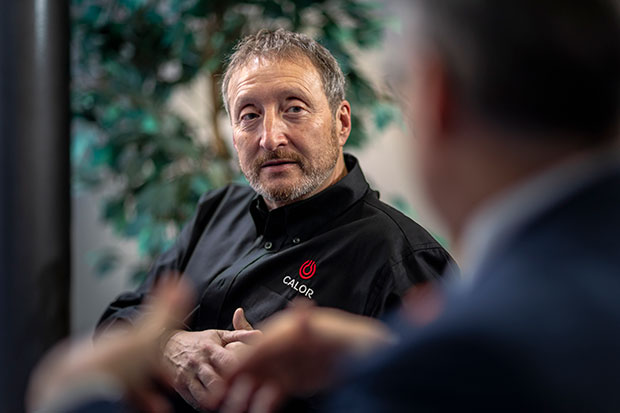As customers and stakeholders scrutinise companies’ sustainability claims more closely, it is becoming more important than ever for businesses to prove that they are operating in an environmentally responsible way. Andy Kellett, National Account Manager FLTs at Calor, explains how those using sustainable fuels for their FLT (forklift truck) fleet can demonstrate their CO2 savings in a robust and fully auditable manner.

The UK’s ambitious net zero carbon target has brought into focus the need to make carbon savings. In fact, our own research (Lowering the carbon emissions of forklift trucks: An industry survey report) identified an overwhelming 95% of those surveyed felt that much more can be done to lower their carbon emissions. However, reducing the carbon footprint whilst remaining cost-effective and operationally efficient in such a competitive sector is no easy task.
Introducing Calor Futuria Liquid Gas
Calor Futuria Liquid Gas (previously BioLPG) is a sustainable fuel made from a blend of waste, residues, and sustainably sourced materials. Available at no extra cost to Calor LPG, FLT businesses looking to make the switch to Calor Futuria Liquid Gas can also ensure cost efficiencies are maximised too.
In addition, Calor Futuria Liquid Gas can be utilised by FLT businesses as part of Calor’s Sustainable tariff, meaning carbon reductions are even more impressive when compared to diesel and conventional LPG. Using a mix of 40% Calor Futuria Liquid Gas and 60% conventional LPG, businesses can reduce carbon emissions by up to 48% (kgCO2e/kWh) compared to using diesel and 33% when compared to conventional LPG. In addition, FLT fleets currently using diesel as a fuel, can also reduce particulate matter by up to 98%, by switching to Calor Futuria Liquid Gas.
The good news is for those businesses already running LPG FLTs, there is no additional investment or change of infrastructure required to move to sustainable Calor Futuria Liquid Gas, because it is chemically identical to LPG
Proving the case
In an era where supply chains and business processes are becoming more complex, being able to calculate carbon reductions made in a trustworthy way cannot be underestimated. Afterall, figures that have been accurately and consistently captured provide all stakeholders with the confidence that claims made about carbon savings are indeed true.
When reporting using the Greenhouse Gas Protocol for instance, businesses must use an instrument that meets the Protocol’s quality criteria, as evidence of any renewable energy consumption. What’s more, by using Renewable Gas Guarantees of Origin (RGGOs) issued by independent schemes, businesses that consume renewable fuels can be fully transparent about how their carbon savings are calculated.
Calor works with the Green Gas Certification Scheme (GGCS), meaning companies using Calor Futuria Liquid Gas to power their forklift trucks can access certificates of their RGGOs, which can then be used when reporting on overall sustainability objectives of the business.
Sustainable supply chain with Calor
To begin the process, companies that produce Calor Futuria Liquid Gas provide an International Sustainability Carbon Certification (ISCC). This sustainability certification system complies with the Renewable Energy Directive (RED) and verifies the carbon savings, and that the feedstock used in Calor Futuria Liquid Gas is from a sustainable source.
The quantity of Calor Futuria Liquid Gas delivered into the country as part of that particular consignment is then logged by the Green Gas Certification Scheme, creating a bank of RGGOs available for companies, like Calor, to issue to its sustainable tariff customers using Calor Futuria Liquid Gas.
As an automated system, the amount of RGGOs is calculated for each customer, dependent on the volume of gas they receive. Recognised certificates detailing the carbon savings the customer has made can also be downloaded from the Green Gas Certification Scheme website, which can be used for auditing purposes.
This system guarantees that the RGGOs Calor customers receive have not been double counted or double sold.
Opting for a supplier that offers an objective means of tracking the origin of sustainable gas through the supply chain not only provides end users with a robust way of proving their carbon reductions, but also enables businesses to demonstrate to their own clients, with confidence, that they are taking action on building a more sustainable future.
The future from Calor
As part of its commitment to offer its customers 100% sustainable energy solutions by 2040, Calor is taking steps to encourage the switch of all its FLT customers over to its Calor Futuria Liquid Gas tariff, and with industry collaboration and government backing, the use of sustainable fuels to power FLTs can play a greater part in achieving the net zero carbon target.
To find out how Calor can help you reach sustainability targets with Calor Futuria Liquid Gas, visit www.calor.co.uk/flt. To find out more about the Green Gas Certification Scheme, visit www.greengas.org.uk.




Comments are closed.